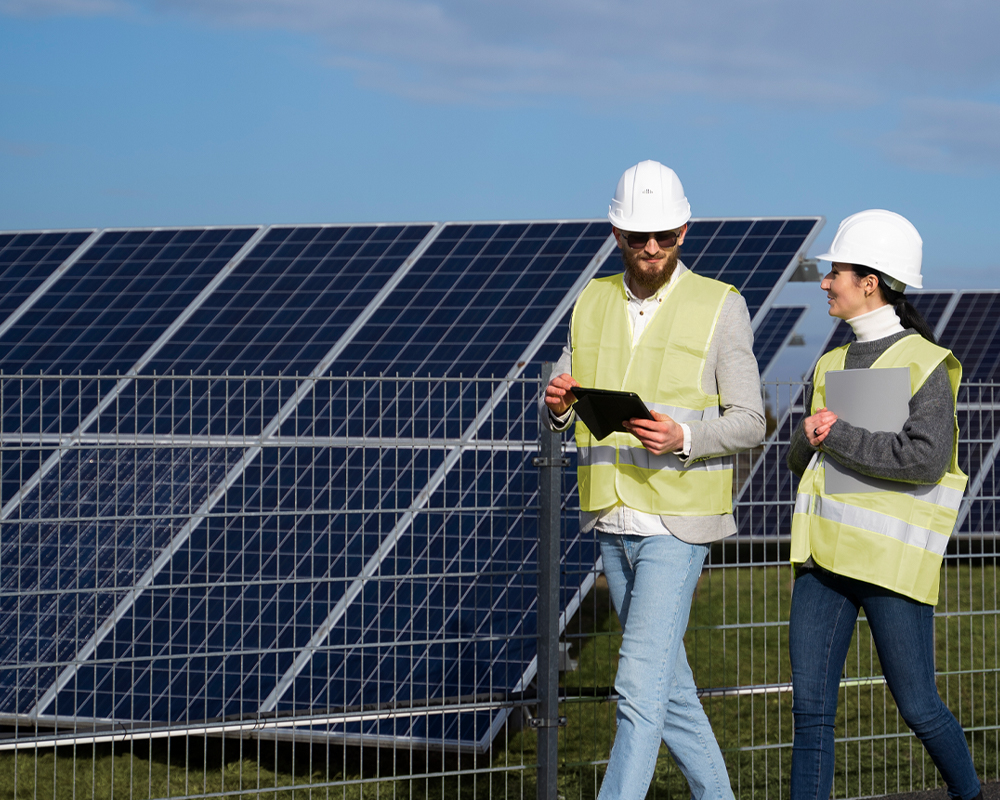Dust and grime can lower your solar output. See why regular cleaning matters for your commercial solar energy system in Garfield and Pitkin counties.

Here’s something many businesses don’t realize: solar panels can lose up to 25% of their efficiency if they’re not clean. That’s right—grime, dust,bird droppings, or pollen can slowly chip away at the performance of your solar investment.
If your panels aren’t performing well, it doesn’t always mean there’sa system failure. Often, it’s just dirt.
In areas with active industries like Garfield and Pitkin, this issue can be more common due to air particles, wind-blown dust, or construction residue settling on panels.
Why Do Solar Panels Get Dirty?
Solar panels are built to handle the outdoors, but that doesn’t makethem self-cleaning. While rain helps wash away some dirt, it’s often not enough—especially in dry, dusty, or high-pollen regions. Bird droppings and pollution can form layers that block sunlight entirely.
Even slight shading on a panel (caused by leaves or dirt patches) can reduce its output. Panels work in series, meaning one dirty section can affect the whole system’s efficiency.
What Happens to Your Energy Savings?
When panels are dirty, they can’t absorb as much sunlight. Less sunlight means less power. And less power means you’re pulling more from the grid—driving up your energy bills.
This is especially important for companies relying on commercial solar energy in Pitkin to manage monthly utility costs. If panels aren’t producing as expected, the financial return on your solar investment begins to shrink.
Dirty panels don’t just cost you money—they delay the payback period of your solar system.
How Often Should You Clean Commercial Solar Panels?
The ideal cleaning frequency depends on location and surroundings:
● Dry, dusty areas: Every 3–4 months
● Urban areas with pollution: Twice a year
● Near trees or birds: Quarterly or more
● Snow-prone regions: Post-winter check-up recommended
Regular inspections—every 6 months—can help you spot buildup before it becomes a problem. A professional service will clean without scratching or damaging the surface.
Can You Clean Them Yourself?
It’s possible—but not always advisable. While you can rinse panels with a hose, using the wrong tools (like harsh brushes or soap) can damage them. Most manufacturers recommend soft, filtered water and non-abrasive materials.
For businesses, hiring a professional solar maintenance team is safer,quicker, and often more cost-effective in the long run.
Maintenance = More Savings
Think of cleaning solar panels like changing the oil in your car. You wouldn’t wait until your engine fails—you do it to keep performance high and prevent damage.
Clean panels give you accurate production numbers, better return on investment, and longer life span for the entire system.
They also reduce the chances of break downs that can interrupt energy savings.
Watch for Warning Signs
You may not always see the dirt, but your system will show signs:
● Noticeable drop in output
● High erelectricity bills
● Visual patches of dirt or bird droppings
● Increased inverter alerts or error codes
Use monitoring apps or software to compare current output with past performance. A dip might be telling you it’s time for a cleaning.
Why Partnering with the Right Team Matters
Clean panels deliver better results—and the right support makes iteasier. SoL Energy helps businesses in Colorado get the most out of their systems with trusted guidance, maintenance options, and long-term support.
With over 20 years of experience in commercial solar energy in Garfield, Pitkin and beyond, SoL Energy is known for making solar simple, clear, and reliable. From planning to up keep,their team stays involved to help your system run efficiently year-round.
Visit sol-energy.com to learn more about their services and local expertise.
FAQs
1. How much energy efficiency do dirty solar panels lose?
Dirty solar panels can lose up to 25% oftheir energy output, especially when coated with dust, bird droppings,or pollen. This loss directly impacts your business's energy savings.
2. How often should commercial solar panels be cleaned?
It depends on your location. Dusty or high-pollen areas may need cleaning every 3–4 months, while urban or tree-heavy zones benefit from cleaning at least twice a year.
3. Does rain clean solar panels well enough?
Rain may rinse off some loose dirt, but it doesn’t fully clean panels. Layers of grime, sticky residue, or bird droppings often require professional cleaning.
4. Can I clean my solar panels myself?
While it’s possible, using the wrong tools or soaps can scratch or damage panels. For businesses, hiring a professional ensures safe, thorough cleaning and protects your investment.
5. What signs suggest my panels need cleaning?
Watch for a sudden drop in output,higher energy bills, visible dirt patches, or alerts from your inverter. These are early signs your panels may need attention.